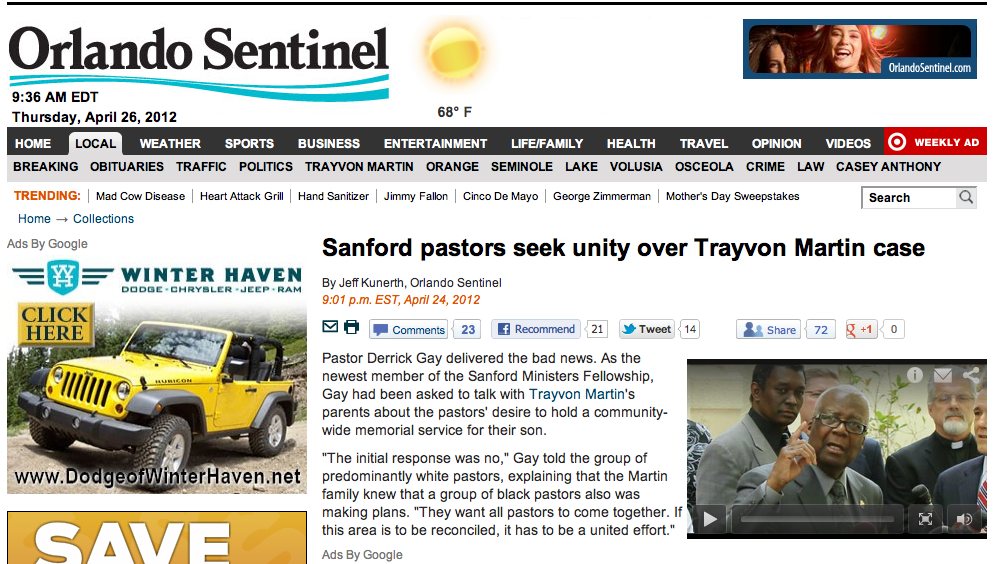Sanford pastors seek unity over Trayvon Martin case
 Pastor Derrick Gay delivered the bad news. As the newest member of the Sanford Ministers Fellowship, Gay had been asked to talk with Trayvon Martin's parents about the pastors' desire to hold a community-wide memorial service for their son.
Pastor Derrick Gay delivered the bad news. As the newest member of the Sanford Ministers Fellowship, Gay had been asked to talk with Trayvon Martin's parents about the pastors' desire to hold a community-wide memorial service for their son.
"The initial response was no," Gay told the group of predominantly white pastors, explaining that the Martin family knew that a group of black pastors also was making plans. "They want all pastors to come together. If this area is to be reconciled, it has to be a united effort."
FIND THIS ARTICLE AT: http://articles.orlandosentinel.com/2012-04-24/news/os-trayvon-martin-sanford-ministers-20120424_1_pastors-holy-cross-episcopal-church-strang-communications
When asked why the Martin family rejected their overture to begin the healing process in a city sharply divided by race, Gay was blunt to his fellow pastors.
"Look around you," said Gay, one of the few black members of the Fellowship. "Frankly, there is a group missing from the room collectively."
The shooting of Trayvon Martin by George Zimmerman has exposed not only the racial divide that shapes Sanford's politics, neighborhoods and culture, but also its churches.
Pastors on both sides — black and white — agree on some things. One is that God has a hand in what is going on and is using Sanford to uncover problems that exist in every city. The second is that for the death of Trayvon to become a transformative event for Sanford's race relations, it must start with the churches.
"We know if there is no unity within us, you won't see it in the community," said Pastor Harlan Walker, senior pastor of Word of Faith Ministries in Sanford.
Sanford finds itself in the unwelcome spotlight of a nation watching it work through the problems of race common in every city. It is both unique and ordinary.
"Sanford is a microcosm for America," said Father Rory Harris, rector of Holy Cross Episcopal Church in Sanford. "We are a broken community, and we need to step forward to show spiritual leadership."
Bringing pastors of all colors, denominations and theologies together was the original idea for the Sanford Ministers Fellowship, said Pastor Jeff Krall, who co-founded the group. The concept was to build personal relationships among ministers, friendships forged over weekly lunches and prayer.
Krall believes that is one of the reasons God chose Sanford: The city could become the model of how crisis can create change.
"We believe that it happened here because there has been some ground work of people of God who want to see communities come together," said Krall, pastor of Family Worship Center in Sanford.
But from the beginning, Krall said, it was hard to enlist black ministers. Some who joined left, saying they felt more comfortable among their own kind. Some members, black and white, left when the group tried to move from talk and prayer to action. Others stayed but became discouraged by too little action and too much talk.
After 20 years, the Fellowship had only about a dozen members.
Trayvon Martin has changed that. A recent Fellowship meeting drew 50 pastors. At another gathering of Seminole County pastors organized by religious publisher Strang Communications, 75 ministers attended, including Northland Church Pastor Joel Hunter and Episcopal Bishop Greg Brewer.
"This event has given us a crisis moment to create unity," said the Rev. Paul Benjamin, a longtime member of the Fellowship.
But the effort to unite must overcome a long history of separation, pastors said. There is no past precedent to follow, no regular interaction between black and white pastors.
"There is no relationship. We are not together," said the Rev. Harry Rucker, senior pastor of Shiloh Missionary Baptist Church in Sanford.
Rucker contends there can be no coming together of black and white pastors until there is an honest and heartfelt reckoning of the racism and injustices that exist in Sanford. Until Trayvon, Sanford functioned as if the racial divide was nonexistent and the problems below the surface of everyday life were unimportant.
"What happens with racism is there is a norm that's not written law, but you know how to move around and you know how to survive under the system," said Rucker, a Sanford pastor for 29 years. "We accepted the separateness, but the white community did as well. The prevailing race problem hinges on comfort."
But the expectation within the black community that religious leadership needs to step forward also revealed the disunity among even Sanford's black churches. An organization of black churches in Seminole existed for a time before dwindling away in the 1990s, Rucker said.
A new group of about a dozen black pastors is in the process of forming. The group will meet again this week, Rucker said, to decide on a name and designate its leaders. Once that is completed, he said, a meeting between white pastors and black pastors might be possible.
"We have to sit down and vent the truth. We have a black and white problem here," Rucker said.

